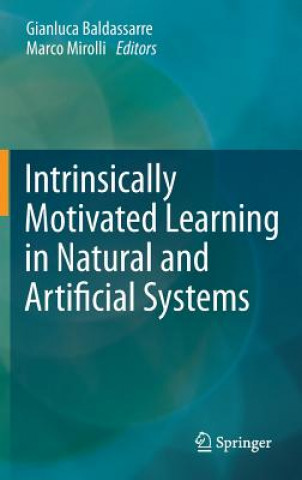
Kód: 01661828
Intrinsically Motivated Learning in Natural and Artificial Systems
Autor Gianluca Baldassarre, Marco Mirolli
It has become clear to researchers in robotics and adaptive behaviour that current approaches are yielding systems with limited autonomy and capacity for self-improvement. To learn autonomously and in a cumulative fashion is one o ... celý popis
- Jazyk:
 Angličtina
Angličtina - Väzba: Pevná
- Počet strán: 458
Nakladateľ: Springer-Verlag Berlin and Heidelberg GmbH & Co. KG, 2013
- Viac informácií o knihe

211.93 €

Skladom u dodávateľa v malom množstve
Odosielame za 12 - 15 dní
Potrebujete viac kusov?Ak máte záujem o viac kusov, preverte, prosím, najprv dostupnosť titulu na našej zákazníckej podpore.
Pridať medzi želanie
Mohlo by sa vám tiež páčiť
-

Fuzziness and Foundations of Exact and Inexact Sciences
137.81 € -
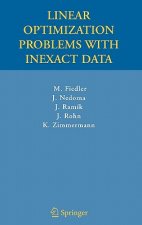
Linear Optimization Problems with Inexact Data
69.96 € -
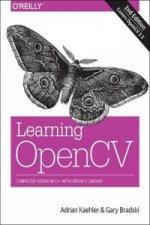
Learning OpenCV
55.81 € -

Mammoth Book of The Lost Chronicles of Sherlock Holmes
13.74 € -12 % -

Advances in Cryptology - EUROCRYPT 2003
137.81 € -

Linear Optimization Problems with Inexact Data
69.96 € -

Evidence-Based Otolaryngology
152.27 € -

Good Night, Gorilla
8.89 € -11 % -

Implosion - Lessons from National Security, High Reliability Spacecraft, Electronics, and the Forces Which Changed Them
81.39 € -

Margins of the Market
96.66 € -

Europe Since 1980
43.88 € -
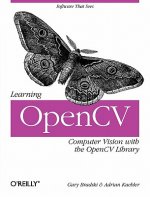
Learning OpenCV
61.98 € -

Home
12.12 € -23 % -

Faces
16.07 € -13 % -

Russell's World
20.62 € -

In Pursuit
17.18 € -

Book of the Sacred Magic of Abramelin the Mage
24.76 € -4 % -

Exhumace
8.28 € -3 % -

Betriebliches Gesundheitsmanagement zur Reduzierung von Fehlzeiten
44.79 € -

GI 11. Jahrestagung
67.44 € -

Levanduľová izba
11.62 € -19 %
Darčekový poukaz: Radosť zaručená
- Darujte poukaz v ľubovoľnej hodnote, a my sa postaráme o zvyšok.
- Poukaz sa vzťahuje na všetky produkty v našej ponuke.
- Elektronický poukaz si vytlačíte z e-mailu a môžete ho ihneď darovať.
- Platnosť poukazu je 12 mesiacov od dátumu vystavenia.
Viac informácií o knihe Intrinsically Motivated Learning in Natural and Artificial Systems
Nákupom získate 530 bodov
 Anotácia knihy
Anotácia knihy
It has become clear to researchers in robotics and adaptive behaviour that current approaches are yielding systems with limited autonomy and capacity for self-improvement. To learn autonomously and in a cumulative fashion is one of the hallmarks of intelligence, and we know that higher mammals engage in exploratory activities that are not directed to pursue goals of immediate relevance for survival and reproduction but are instead driven by intrinsic motivations such as curiosity, interest in novel stimuli or surprising events, and inter est in learning new behaviours. The adaptive value of such intrinsically motivated activities lies in the fact that they allow the cumulative acquisition of knowledge and skills that can be used later to accomplish tness-enhanc ing goals. Intrinsic motivations continue during adulthood, and in humans they underlie lifelong learning, artistic creativity, and scientific discovery, while they are also the basis for processes that strongly affect human well-being, such as the sense of competence, self-determination, and self-esteem.§This book has two aims: to present the state of the art in research on intrinsically motivated learning, and to identify the related scientific and technological open challenges and most promising research directions. The book introduces the concept of intrinsic motivation in artificial systems, reviews the relevant literature, offers insights from the neural and behavioural sciences, and presents novel tools for research. The book is organized into six parts: the chapters in Part I give general overviews on the concept of intrinsic motivations, their function, and possible mechanisms for implementing them; Parts II, III, and IV focus on three classes of intrinsic motivation mechanisms, those based on predictors, on novelty, and on competence; Part V discusses mechanisms that are complementary to intrinsic motivations; and Part VI introduces tools and experimental frameworks for investigating intrinsic motivations.The contributing authors are among the pioneers carrying out fundamental work on this topic, drawn from related disciplines such as artificial intelligence, robotics, artificial life, evolution, machine learning, developmental psychology, cognitive science, and neuroscience. The book will be of value to graduate students and academic researchers in these domains, and to engineers engaged with the design of autonomous, adaptive robots.§The contributing authors are among the pioneers carrying out fundamental work on this topic, drawn from related disciplines such as artificial intelligence, robotics, artificial life, evolution, machine learning, developmental psychology, cognitive science, and neuroscience. The book will be of value to graduate students and academic researchers in these domains, and to engineers engaged with the design of autonomous, adaptive robots.It has become clear to researchers in robotics and adaptive behaviour that current approaches are yielding systems with limited autonomy and capacity for self-improvement. To learn autonomously and in a cumulative fashion is one of the hallmarks of intelligence, and we know that higher mammals engage in exploratory activities that are not directed to pursue goals of immediate relevance for survival and reproduction but are instead driven by intrinsic motivations such as curiosity, interest in novel stimuli or surprising events, and inter est in learning new behaviours. The adaptive value of such intrinsically motivated activities lies in the fact that they allow the cumulative acquisition of knowledge and skills that can be used later to accomplish tness-enhanc ing goals. Intrinsic motivations continue during adulthood, and in humans they underlie lifelong learning, artistic creativity, and scientific discovery, while they are also the basis for processes that strongly affect human well-being, such as the sense of competence, self-determination, and self-esteem.§This book has two aims: to present the state of the art in research on intrinsically motivated learning, and to identify the related scientific and technological open challenges and most promising research directions. The book introduces the concept of intrinsic motivation in artificial systems, reviews the relevant literature, offers insights from the neural and behavioural sciences, and presents novel tools for research. The book is organized into six parts: the chapters in Part I give general overviews on the concept of intrinsic motivations, their function, and possible mechanisms for implementing them; Parts II, III, and IV focus on three classes of intrinsic motivation mechanisms, those based on predictors, on novelty, and on competence; Part V discusses mechanisms that are complementary to intrinsic motivations; and Part VI introduces tools and experimental frameworks for investigating intrinsic motivations.§The contributing authors are among the pioneers carrying out fundamental work on this topic, drawn from related disciplines such as artificial intelligence, robotics, artificial life, evolution, machine learning, developmental psychology, cognitive science, and neuroscience. The book will be of value to graduate students and academic researchers in these domains, and to engineers engaged with the design of autonomous, adaptive robots.
 Parametre knihy
Parametre knihy
Zaradenie knihy Knihy po anglicky Mathematics & science Biology, life sciences Life sciences: general issues
211.93 €
- Celý názov: Intrinsically Motivated Learning in Natural and Artificial Systems
- Autor: Gianluca Baldassarre, Marco Mirolli
- Jazyk:
 Angličtina
Angličtina - Väzba: Pevná
- Počet strán: 458
- EAN: 9783642323744
- ISBN: 364232374X
- ID: 01661828
- Nakladateľ: Springer-Verlag Berlin and Heidelberg GmbH & Co. KG
- Hmotnosť: 868 g
- Rozmery: 239 × 165 × 32 mm
- Dátum vydania: 10. April 2013
Obľúbené z iného súdka
-

The Molecule of More
18.09 € -14 % -

Evolution
28.51 € -8 % -

Power, Sex, Suicide
13.14 € -23 % -
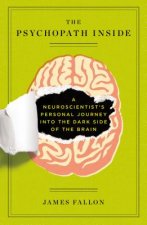
Psychopath Inside
16.98 € -11 % -

Murderous Minds
16.17 € -6 % -

Science of Meditation
12.12 € -23 % -

Oxygen
12.12 € -23 % -

Equine Genomics
226.90 € -

Race Differences in Intelligence
35.38 € -
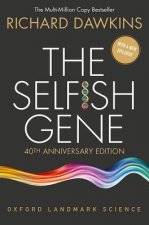
The Selfish Gene
11.52 € -19 % -

Undoing Project
11.01 € -14 % -

Biology of Belief
17.48 € -23 % -

Power of Habit
11.92 € -24 % -

Sapiens
21.53 € -
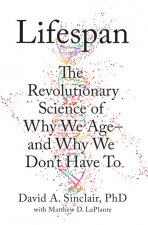
Lifespan
23.85 € -23 % -

The Extended Phenotype
12.73 € -19 % -
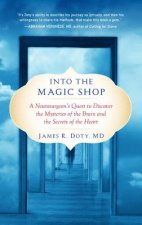
Into the Magic Shop
14.85 € -22 % -

Homo Deus
11.52 € -19 % -

Cosmic Serpent
10.51 € -26 % -

Greatest Show on Earth
11.52 € -19 % -

Speculations on the Evolution of Human Intelligence
9.60 € -7 % -

Blind Watchmaker
12.93 € -22 % -

We Are Our Brains
11.52 € -19 % -

River Out of Eden
11.01 € -23 % -

Brain Book
23.55 € -16 % -
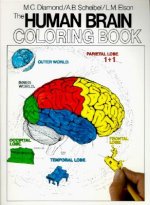
Human Brain Coloring Book
21.02 € -12 % -

Crack In Creation
17.48 € -4 % -

Schaum's Outline of Genetics, Fifth Edition
28.71 € -14 % -
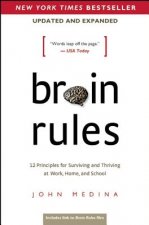
Brain Rules (Updated and Expanded)
16.37 € -3 % -

Hidden History of the Human Race
13.84 € -18 % -
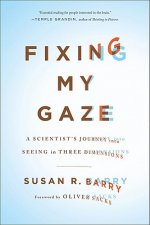
Fixing My Gaze
22.14 € -

Neanderthal Man
15.97 € -21 % -

Why We Run
16.78 € -12 % -

On Natural Selection
9.90 € -
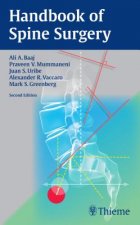
Handbook of Spine Surgery
97.87 € -9 % -

Cartoon Guide to Genetics
16.37 € -23 % -

Ecological Thought
33.06 € -

Creative Evolution
15.36 € -19 % -

Brief History of Everyone Who Ever Lived
10.81 € -24 % -

Consciousness
15.97 € -16 % -

Social Conquest of Earth
16.88 € -12 % -
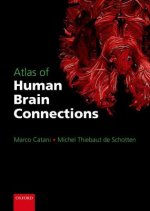
Atlas of Human Brain Connections
142.37 € -

Double Helix
18.29 € -3 % -

Masters of the Planet
15.97 € -21 % -

Vital Dust
32.45 € -

What Mad Pursuit
29.01 € -

Zooarchaeology and Modern Human Origins
120.12 € -

Handbook of Schizophrenia Spectrum Disorders, Volume I
211.93 € -

Tree of Life
48.93 € -3 %
Osobný odber Bratislava a 2642 dalších
Copyright ©2008-24 najlacnejsie-knihy.sk Všetky práva vyhradenéSúkromieCookies


 21 miliónov titulov
21 miliónov titulov Vrátenie do mesiaca
Vrátenie do mesiaca 02/210 210 99 (8-15.30h)
02/210 210 99 (8-15.30h)